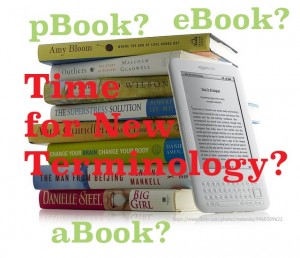
Author Jerry Weinberg recently posted this on a listserv and gave permission for folks to use it. He asks a provocative question about how we refer to books.
A pet peeve of mine:
Because books (usually) made of paper have been around for hundreds of years, they have captured the name “book” as their exclusive property.
Because electronic books have been around for about one generation, they have a different designation, “e-books,” which makes them sound like they’re not real “books.”
I’ve started distinguishing between the two types by calling the old type “p-books.” P could stand for paper, or print, or perishable, or whatever you choose.
The e in e-books could stand for electronic, easy-to-use, enduring, elastic (for their ability to change dynamically), or whatever you choose.
Both p-books and e-books are equally “books,” not “real books” and some “johnny-come-lately pretend books.”
And who knows, maybe there will be other types of book – x-books, for any number of x’s. (like a-books for books delivered in audio format)
I’m encouraging my friends and colleagues to use this nomenclature, rather than “e-books” and “dead-tree-books” or some other clumsy attempts to bring e-books to the same stature as p-books.
From now on, I’m using the term “book” to refer only to the contents, not the form. If I’m talking about a paper book only, I’m using p-book.
If you’d like, feel free to join the campaign. Thanks for listening.
Jerry
Please leave a comment–do you think pBook is a good term for print/paper books? Does aBook for for audio books?



